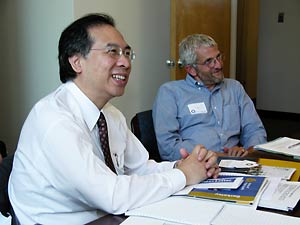Berkeley, Hong Kong educators share SARS experiences and strategies
BERKELEY – Senior public health and educational faculty from the Chinese University of Hong Kong met this week with UC Berkeley health professors and other officials this week to share their frontline experiences with Severe Acute Respiratory Syndrome (SARS).
The UC Berkeley SARS Task Force asked the Hong Kong educators to come to campus to inform its SARS planning and to forge a long-term, information-sharing relationship. UC Berkeley initially restricted summer enrollment for students from SARS-infected areas and developed contingency housing plans in the event that any students showed symptoms of SARS and needed to be quarantined. No restrictions are now in place.
 Professor Jack C.Y. Cheng (left), dean of students at the Chinese University of Hong Kong, and Dr. Arthur L. Reingold, professor and head of epidemiology at UC Berkeley's School of Public Health, discuss lessons learned during the SARS outbreak. (Jeff Wason photo) |
The Chinese University authorities - from the campus's school of public health, Prince of Wales Hospital and administration - described on July 21 and 22 their urgent efforts to diagnose and confirm SARS, search for effective treatments, assess the possible spread of SARS, develop quarantine procedures, and allay community fears.
"Hong Kong has gone through its Dark Ages in the past three months," said Dr. Joseph Sung, chair of Chinese University's department of medicine.
He and his companions described some of the precautions taken by their university after the SARS outbreak last spring. Measures included suspending classes while the entire campus - floors, air ducts, counters, desks and more - was disinfected, and quarantining exam papers if a student was suspected of having SARS. Steps also were taken to quarantine people who were in close contact with SARS victims at home and at work. Special leave was provided to staff suspected of having SARS.
As the outbreak continued, Sung said, Chinese University authorities emerged as leaders in the research and control of the new disease, contributing to models for predicting SARS, guidelines for SARS control, clinical protocols for treating the disease, and analysis of the SARS-corona virus genome.
Yet to this day it remains unclear what drugs and therapies are most useful to combat the disease, as well as how SARS virus strains mutate.
"I think we still have at least a few years to go before a vaccine is developed," said Dr. Jack Cheng, pro-vice chancellor, university dean and professor of orthopedics and traumatology at Chinese University. "There are a lot of unknowns."
One of the unknowns is whether SARS will return this fall and winter with the kind of vengeance it had last spring. Because scientists do not know the source of the virus or how to treat it, the Hong Kong officials are not optimistic. "In all likelihood, there is a 50 percent probability that it will return," Cheng said.
Because it has been in the eye of the SARS storm, Chinese University is proposing the establishment of a Center for Emerging Infectious Disease to provide professional training for health care professionals and researchers, conduct public health and other research on these diseases, and give expert consultation to governments and others. Other work would include mathematical modeling of new diseases, genetic epidemiology, vaccine development and disease mapping.
Plans call for close collaboration with the China's Ministry of Health and the country's academic institutions, and with schools of public health around the world. There also have been preliminary discussions about visiting professorships and courses that could be offered jointly with the CDC in China.
Dr. Suzanne Chan Ho, a professor at Chinese University's Department of Community and Family Medicine who earned her BS degree in physiology at UC Berkeley in 1968, said UC Berkeley would be welcomed into the center if it decided to join.
For their part, UC Berkeley officials shared their research into areas such as tuberculosis and other emerging infectious diseases, the tracking of emerging infectious diseases, and disease resistance. They also gave the Hong Kong representatives a tour of the Tang Center, home of University Health Services.
Dr. Tomás Aragón, director of the UC Berkeley Center for Infectious Disease Preparedness and a member of the UC Berkeley SARS Task Force, said it is important for UC Berkeley to interact with groups and institutions directly facing these types of crises, and to incorporate their findings into the public health curriculum.
He called the Monday and Tuesday meetings "a good example of collaborative learning."

